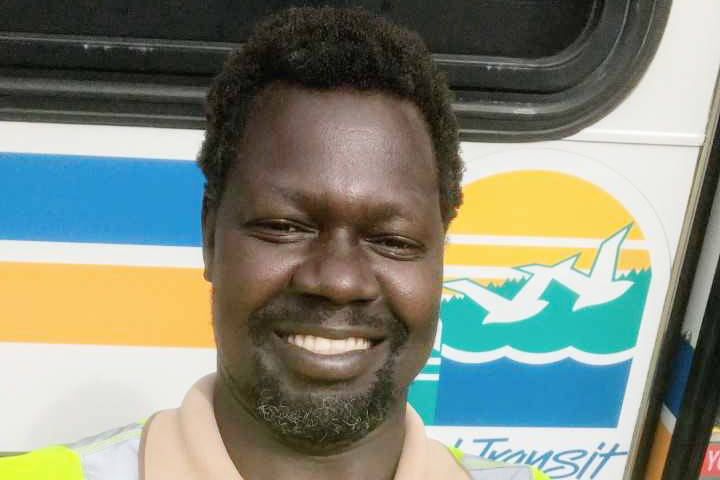It doesn’t cost much to take the bus in Uganda. About 25 cents. But if you don’t have the money, you walk. That’s what Ioum Martin did in his home country. He walked everywhere. So, when he came to America chasing the dream of a better life, he continued to walk. Until he found Island Transit.
“Life would have been miserable for me without the Island Transit bus,” says Martin who was working a construction job in Everett when he first moved to Whidbey Island. Four days a week, he would walk over nine miles from Freeland to Clinton to catch the ferry. It was a slow and painful walk too. His ankle was broken at the time.
“One day I sat down by the roadside in Bayview,” Martin says, adding he was exhausted and feeling defeated. “A lady asked me if I knew about Island Transit. I told her I don’t have money for the bus. She told me how it worked – that it was free.”
Martin says discovering Island Transit brought him hope. “I don’t think I would have been able to get to work, go to school, or get around without the bus,” says Martin.
Not only does public transit give Martin a way to get around, it also helps him budget his money and time. He is currently working towards earning his high school diploma by taking classes at Skagit Valley College. A father of 10, he spends a lot of time talking by phone with his family back in Uganda and hopes some of them will be able to join him one day.
Established in 1987 as a fare-free bus system, Island Transit provides an essential service to the community. “Safe, reliable and affordable public transportation enables people to meet their day-to-day needs,” says Todd Morrow, Island Transit Executive Director. “It makes our community more inclusive by increasing mobility and opportunity. It literally and figuratively picks people up.” As such, “Public transit is a powerful tool to help advance equity and social justice.”
Morrow also believes providing fair and just transportation is the role of a community. “It’s an essential public service like our public schools, police and fire departments,” he says. “A strong public transit network benefits us all. It supports our local economy and environment, as well as those who rely on it to get around.”
Martin doesn’t have to walk long distances in the cold weather any more. He’s saving money, and time, to do things that make his life better. When asked what other benefits Martin has found with riding the bus, he humorously says, “I’m always on time!”
To read more stories from people who ride public transit, go to www.islandtransit.org/WhyIRide



